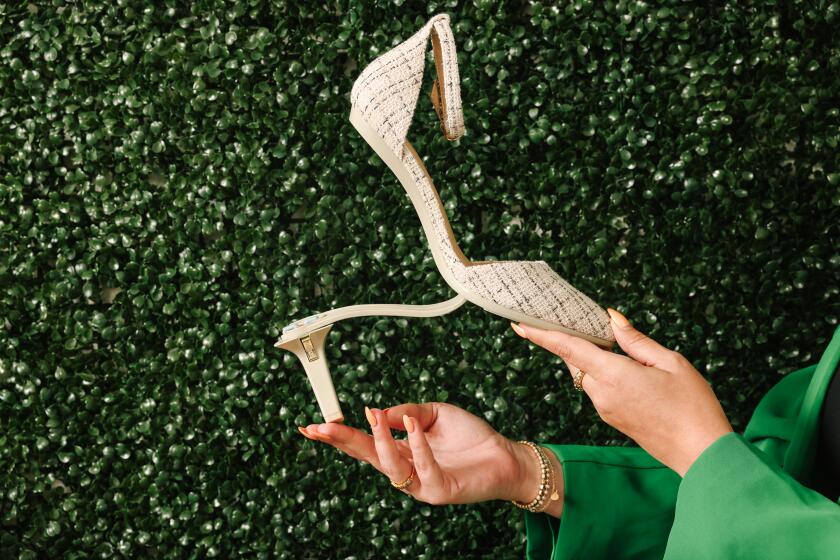Having a Ball : Feted for Charity Work, They Reject the ‘Debutante’ Label
The Grand Ballroom of the Beverly Wilshire hotel was all 18th-Century elegance with its marble, mirrors and crystal chandeliers.
But in the cramped backstage area, where racks of clothes vied for space with teen-aged girls, doting mothers and beauticians, the dress code ran to T-shirts, jogging outfits and running shoes.
Excitement verged on nervousness as the 26 Palos Verdes Peninsula high school seniors laughed and chatted and got ready for “their day.”
And a very long day it was as the girls were saluted by friends and family for a collective 12,466 hours of charity work, ranging from “adopting” grandmothers at a nursing home to ushering at the Norris Community Theater.
They were the 1987 graduating Ticktockers of the National Charity League’s Peninsula chapter, winding up a part of their life that started in the seventh grade.
“This wasn’t real until last night,” said 17-year-old Jody Keller. “It’s hard to believe it will be over by tonight.”
The world would call them debutantes, even though the charity league that sponsored the event and similar Palos Verdes Peninsula groups bristle at the word. They prefer to call such events “presentations.”
The Peninsula groups reflect a change that came to the deb world in the 1970s, when the popular image of debutantes--beauteous party-goers with wealthy fathers, a gift for smart remarks and a fondness for champagne--gave way to the concept of young women performing community service and being rewarded at teas, luncheons and dinner-dances.
On the Palos Verdes Peninsula, three groups sponsor such events, which they concede still have many trappings of more traditional debutante balls.
At the Charity League event two weeks ago, the “presentations”
started with a fashion show before nearly 900 smartly dressed luncheon guests, some of whom had flown in for the occasion.
The girls had been transformed into models, striding and dancing, turning and dipping--and, in a few cases, clomping--to applause and whistles as they showed off a collection of sometimes gaudy, sometimes severe Laura Ashley fashions.
Later, the girls were individually presented to the audience gathered in Beverly Hills, to the recorded strains of their favorite songs, as a narrator recounted their accomplishments, their memories and their plans.
Holding red roses against pristine white gowns, many with full skirts and puffed sleeves, they made their way down the runway again, this time walking in slow dignity but with broad smiles. They were met by their parents, and their mothers placed gold medallions attached to white ribbons around their necks.
Recognized for Service
“We don’t like the concept of a traditional deb ball,” said the league’s Sharon Guthrie, explaining that families are not asked to contribute large sums to charity to present their daughters in a display of riches. “The girls are recognized for six years of community service.”
Joan Cobble of Las Madrecitas, a Peninsula group that supports Orthopaedic Hospital in Los Angeles and presents senior girls at a December Evergreen Ball in Beverly Hills, said: “We are acknowledging the fact that the girls have done this service and we’re proud of them and we want the members of our organization to see what they have done.” The girls, called Las Ninas, do a variety of things at the hospital, primarily entertaining children.
The third Peninsula group that sponsors such events is the San Pedro-Palos Verdes chapter of the Assistance League, which was to introduce seven girls at a dinner-dance Saturday at the Beverly Hills Hotel. The girls, called Assisteens, have put in two to six years of helping with group charities, mostly working in the league’s San Pedro gift shop.
Commentators who keep tabs on debs say that some things haven’t changed: The girls still wear beautiful dresses, are fussed over by families and escorts, and party with new friends. Deb balls, said one publicist for such affairs, “have been going on since Marie Antoinette’s time and give a girl the opportunity to be a princess for an evening.”
Work More Important
But if modern debs can still waltz or stand graciously in a receiving line, they also have put in time on hospital wards and learned things such as CPR.
Several Peninsula young women said that while being presented is exciting, even something they look forward to for months, the charity work is more important. “I worked at the hospital to grow as a person, not to get presented,” said Jennifer Baszile, 17, who was presented at last December’s Evergreen Ball.
Her mother, Janet Baszile, who is on the executive board of Las Madrecitas, said the service work helps the girls mature, and “they get a glimpse of life outside Palos Verdes.”
Ticktocker Keller, who did volunteer work at Harbor-UCLA Medical Center, said, “There was one girl with her hand completely burned off. It was tough to sit there and talk to her. It makes you feel how lucky you are.”
Even though Peninsula charity groups reject the “high-society debutante” label, the presentations carry high price tags. A white gown, frequently a wedding dress minus the train, can cost $1,000, although most spend less and girls and their mothers sometimes make the dresses. Then there are photos, luncheon or dinner tickets for friends and family, and sometimes a suite at the hotel.
Charity league members are told to expect to spend $1,000 to present their daughters. But Janet Baszile said she spent about $2,000 on Jennifer last year, and said some parents spend even more. “It could be very difficult to be in this kind of organization without the discretionary income,” said Baszile, adding that mothers and daughters also must have time to devote to charity work.
Presentations may be the social highlight of teen-age charity work on the Peninsula, but there are other elements, too. Girls take their mothers out to surprise brunches, take trips to places like Catalina Island and put on their own fashion shows. Mothers take their daughters to the theater, fathers take them to sporting events and there are even skiing and white-water rafting excursions.
The young women also raise money on their own for charity, selling such things as candy and Christmas greenery.
Most Are White
Although racial minorities have been moving to the Peninsula in recent years, charity groups remain almost entirely white. The 150-member charity league, for example, has only four Asians and no blacks, said league member Nancy Bolton.
Janet Baszile, who is black, said she is the only nonwhite in Las Madrecitas. “I would like to see it reflect the ethnicity of the Peninsula, but it does not so far because people in the organization sponsor their friends to become members,” she said. “On the whole, most Anglos have a limited number of nonwhite friends.”
Three black girls from the Peninsula were presented by Palos Verdes Links at an annual ball at the Century Plaza sponsored by Los Angeles Links, a black charity group.
Presentations take months of preparation. The girls have lessons in modeling and etiquette so that they can display themselves, and the clothes they wear, to perfection. At evening presentations, girls dance the first waltz with their fathers, so there are lessons on how to do it right.
“It’s as if we are 26 mothers of the bride and are putting on one wedding for 26 girls,” said Rita Moyers, who presented her daughter, Kimberly, at the charity league luncheon. “We all have a common goal to make this a special day for the girls.”
The mothers arrived early at the hotel with their daughters, putting out programs and table favors and giving moral support--as well as a bit of coaching--as the girls practiced modeling and walking down the runway in the spotlight.
“One of the biggest fears of mothers and girls is getting on the runway and tripping and falling,” said Rita Moyers. “It has never happened, but it is a concern.” She also said no one has ever bolted from the stage in fright, although there are sometimes tears born of nerves or sentiment.
Several girls said that being presented makes them feel that they have accomplished something and are, as one put it, “ready for the world.”
Nearly all of the senior Ticktockers are college-bound next fall, but not before sightseeing in Europe or tanning in Hawaii. One plans to spend her summer showing her lop-eared French rabbit in competition.
A couple of them already have professional careers in the works. Tennis whiz Cameron MacGregor turned pro at 17, has played at Wimbledon and said she will be “counting my money in five years.” Ballet dancer Alice Wilson has attended schools of the Joffrey, New York City and San Francisco ballets.
Some hope to become financially successful as corporate executives or owners of boutiques and resorts. One wants to be a model, another a nurse.
David Moyers said the fathers take part--they took their daughters as a group on the rafting trip--but the charity league really is a mother-daughter project. “It’s an opportunity for mothers and daughters to do something for others as a team and to get a great deal for themselves,” he said.
‘Fathers Pay’
At the luncheon, fathers were in the background, prompting Stuart Wong, whose daughter, Becky, was presented, to say, “The mothers organize it, but the fathers pay.”
Fathers will be in the spotlight, however, at the next event for the Ticktocker seniors, a reception and dinner at the Long Beach Breakers hotel on May 2, where the girls will again wear white gowns and waltz with their dads.
Women in the charity groups say that the teen-agers are enthusiastic about being involved and few drop out. But when it comes time to be presented, some balk. One father, who asked that his name not be used, said that when it came time for his daughter’s presentation, they weren’t getting along. “She didn’t want me to present her,” he said.
Lee Brown said her daughter, Christina, enjoyed working at Orthopaedic Hospital but declined to be presented at the Evergreen Ball because she said “she wouldn’t be caught dead” in a white debutante dress.
Mothers ‘More Interested’
“I was disappointed, but I didn’t want to make her do something she didn’t want to do,” Brown said, adding that mothers encourage their daughters to go into the charity groups “and sometimes are more interested in it than the girls are.”
An underlying goal of the tradition is to help girls form a close relationship with their mothers.
“We as mothers and daughters are involved in preparing sandwiches, learning formalities of the tea, how it is given, how it is presented, writing handwritten invitations, being in a receiving line,” said Nancy Bolton, who is chairwoman of the May charity league reception.
She said she hopes the girls will carry through on “the formality of knowing how to entertain and contribute to our society and community. I hope they will carry that out, though we know times are changing.”



